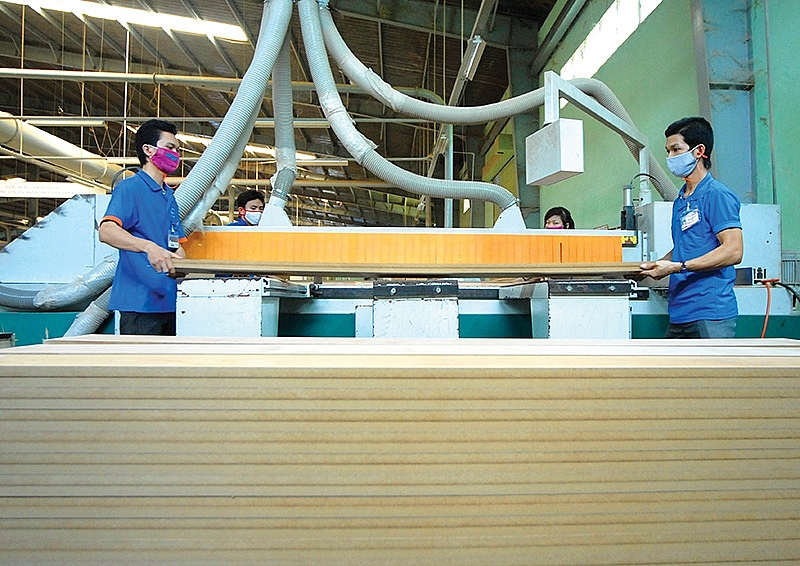Timber trade pressed to resolve exporting concerns
 |
| Timber trade pressed to resolve exporting concerns. Photo: Le Toan |
Should the investigation result in trade remedies, the domestic industry may need to shift its exports to other markets.
Vu Hai Bang, general director of Woodland JSC, said the US investigations have led to a 25 per cent reduction in their orders, mostly because its partners are concerned about being taxed like China. Bang said his company may suffer “heavy losses” depending on how the US acts on investigation outcomes.
Several years after the United States and Vietnam normalised relations, US importers did not want to entirely depend on Chinese suppliers for wood products. From that time, American buyers started seeing Vietnam as a reliable furniture supplier.
Cindy Squires, executive director at the International Wood Products Association (IWPA) said in a statement on October 6, “Vietnam is an important trading partner for wood products and a significant growing market for US hardwoods.”
In the early 2000s, wood products and furniture imports from Vietnam a saw massive boom, increasing over 56 times to $902 million in 2006.
In the first eight months of 2020, the US was one of the top five export markets for Vietnamese wood and wood products, along with Japan, China, South Korea, and the EU. American customers are currently mainly interested in sofas and kitchen cabinets – two commodity groups rapidly increasing exports from Vietnam to this and other markets.
Vietnamese producers are being asked to be wary of risks in the timber trade, such as fraud. However, recent research from Forest Trends and several Vietnamese wood associations have been fairly positive for Vietnam when providing data on trade fraud committed by foreign manufacturers when exporting wooden products into the US.
Le Sy Giang, director of GH Consulting Company, which specialises in trade competition, said the current US investigation aims to analyse whether Vietnamese wood products are real and have their origin in Vietnam or not. If domestic companies provide proper paperwork and prove their case, Giang said, the investigations may not cause issues. However, should enterprises only assemble components imported from other markets, it will be impossible to convince the US Department of Commerce.
Giang explained that businesses should see this an opportunity, as the US investigation will contribute to improving local business practices. “If carried out and explained well, the US side will react completely positive. Afterwards, Vietnamese businesses would most likely be more competitive than their competitors in the US,” Giang said,
Giang, a former head of the Trade Remedies Authority of Vietnam under the Ministry of Industry and Trade, noted that it is important to consult attorneys from the US.
However, in the context of the pandemic, lawyers from the US and beyond will mostly be unable to travel to Vietnam to talk directly with businesses during the investigation, which is a significant disadvantage. Thus, it is crucial for domestic businesses to contact US law firms together with partners in Vietnam to find solutions on how to prove their cases.
The IWPA’s Squires reassured, “We will encourage active discussions between Vietnam and the United States so that a resolution to this matter can be achieved in quick fashion, in order to provide certainty for businesses.”
What the stars mean:
★ Poor ★ ★ Promising ★★★ Good ★★★★ Very good ★★★★★ Exceptional
Related Contents
Latest News
More News
- VNPAY and NAPAS deepen cooperation on digital payments (February 11, 2026 | 18:21)
- Vietnam financial markets on the rise amid tailwinds (February 11, 2026 | 11:41)
- New tax incentives to benefit startups and SMEs (February 09, 2026 | 17:27)
- VIFC launches aviation finance hub to tap regional market growth (February 06, 2026 | 13:27)
- Vietnam records solid FDI performance in January (February 05, 2026 | 17:11)
- Manufacturing growth remains solid in early 2026 (February 02, 2026 | 15:28)
- EU and Vietnam elevate relations to a comprehensive strategic partnership (January 29, 2026 | 15:22)
- Vietnam to lead trade growth in ASEAN (January 29, 2026 | 15:08)
- Japanese business outlook in Vietnam turns more optimistic (January 28, 2026 | 09:54)
- Foreign leaders extend congratulations to Party General Secretary To Lam (January 25, 2026 | 10:01)

 Tag:
Tag:




















 Mobile Version
Mobile Version